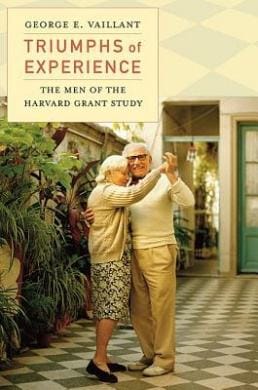
If you look up the Grant Study of 268 Harvard Men (began in 1939) and the Glueck Study of Juvenile Delinquency (began in 1940) you will find the beginnings of what became the Harvard Study of Adult Development that continues today.
In 2012, when the book “The Triumphs of Experience” by George E Vaillant was published, all of the Harvard Men who were still alive (30%, 80 men) were in their 90’s and the author reports not only that most of them lived long lives, but that in their 90’s they remained very active and happy. That seems to run against what health statistics tell us. There is a chapter about the last decade, where the viewpoint of people who are 90 years old tells an interesting story.
After more than 40 years work, George Vaillant was asked by a reporter to identify the most important finding of the Grant Study. Vaillant replied, “The only thing that really matters in life are your relations with other people.”
In the 1940’s both the military, and business leaders had strong ideas about what they were looking for in young men they expected to train to be future leaders. A strong muscular physique, academic success, success on the sports-field, social popularity or coming from the right social class. All of these “desirable characteristics” proved to be unreliable characteristics of future leaders.
Four characteristics of these men that were measured by the Grant Study proved eventually to be very important to their future success in life. A childhood environment that was very supportive. (The study neglected to ask enough about this.) A strong positive answer to the question “Did your mother love you?” was predictive of the future strength to overcome adversity in life. Being socially active and strongly engaged with other people at age 47 was important. Being rated as “sound” at the age of 21 at Harvard, was a good indicator. Being rated as using “mature defenses” by psychologists at age 47 was helpful. The point is that success is not made on the football field of Eton or Harvard.
According to George Vaillant, there are TWO, pillars of success in your 90’s, one is the capacity to love, and the second is the ability to cope with the inevitable difficult times in a way that does not push love away. Good health, both mental health and physical health does exist, and can be maintained into old age.
In one’s life what looks like trouble, may become the process by which healing takes place. For instance, despite having a bleak distant mother, and a father who was seldom present, one participant found love, and was very successful in the choice of a life partner. Bad, things happen, but usually in a lifetime the good things in one’s life far outweigh the bad. People continue to change and grow throughout their lives, and we are enriched and sustained by the people around us.
What goes right in your life, is far more important than what goes wrong.
Before you watch this long video check these pages. (Tablet)
The Grant Study – Triumphs of Experience. (Open Future Health, 2016)
What is Successful Ageing? (Open Future Health, 2016)
This video is mostly about marriages, and success in life.
The Grant Study of 268 Carefully Chosen “Leaders”
In his book “Adaptation to Life” (1977) the psychologist, George Vaillant describes how became the Director of the Grant Study. In a remarkable but very dense and difficult book, described as a “landmark” Vaillant demonstrates the “adaptive psychological mechanisms” that the men in the study used to cope with success and failure. At the time both military and business leaders though they could pick future leaders in university, that they would be excellent scholar’s, tall upright and outstanding on the sports ground, and socially well rounded. With 2 or 3 exceptions the 268 Grant Study Men were chosen for those virtues.
It transpired that every one of them faced difficult times. That the key to success in difficult times was the ability to keep showing up and to maintain the struggle. Which of the men did that best? Those who knew that their mother loved them.

